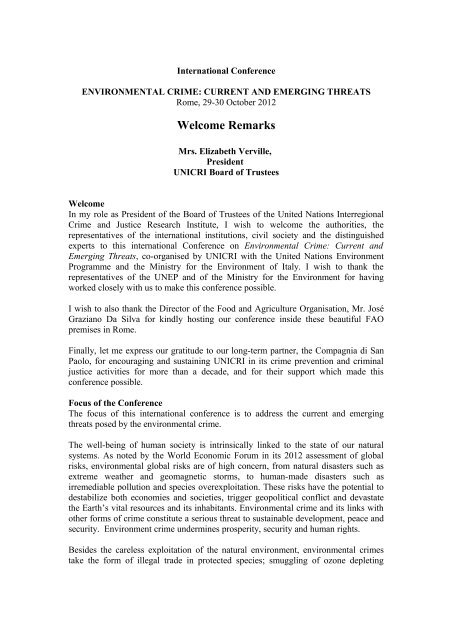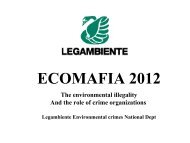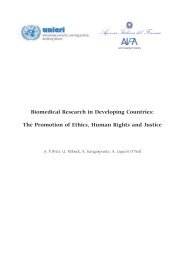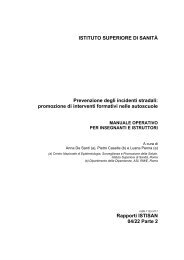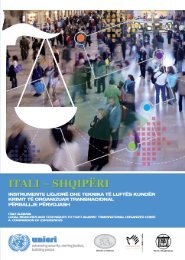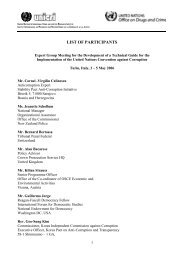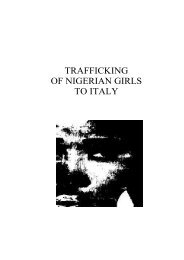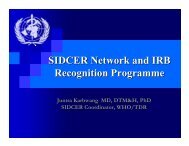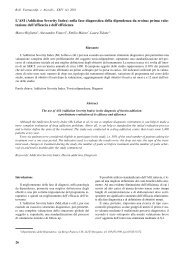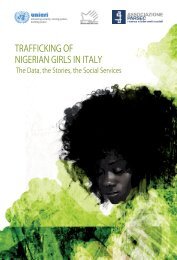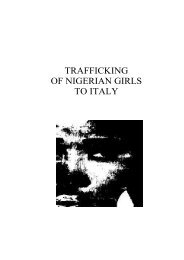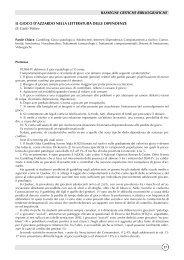Project Description (Background and Justification) - UNICRI
Project Description (Background and Justification) - UNICRI
Project Description (Background and Justification) - UNICRI
Create successful ePaper yourself
Turn your PDF publications into a flip-book with our unique Google optimized e-Paper software.
International Conference<br />
ENVIRONMENTAL CRIME: CURRENT AND EMERGING THREATS<br />
Rome, 29-30 October 2012<br />
Welcome Remarks<br />
Mrs. Elizabeth Verville,<br />
President<br />
<strong>UNICRI</strong> Board of Trustees<br />
Welcome<br />
In my role as President of the Board of Trustees of the United Nations Interregional<br />
Crime <strong>and</strong> Justice Research Institute, I wish to welcome the authorities, the<br />
representatives of the international institutions, civil society <strong>and</strong> the distinguished<br />
experts to this international Conference on Environmental Crime: Current <strong>and</strong><br />
Emerging Threats, co-organised by <strong>UNICRI</strong> with the United Nations Environment<br />
Programme <strong>and</strong> the Ministry for the Environment of Italy. I wish to thank the<br />
representatives of the UNEP <strong>and</strong> of the Ministry for the Environment for having<br />
worked closely with us to make this conference possible.<br />
I wish to also thank the Director of the Food <strong>and</strong> Agriculture Organisation, Mr. José<br />
Graziano Da Silva for kindly hosting our conference inside these beautiful FAO<br />
premises in Rome.<br />
Finally, let me express our gratitude to our long-term partner, the Compagnia di San<br />
Paolo, for encouraging <strong>and</strong> sustaining <strong>UNICRI</strong> in its crime prevention <strong>and</strong> criminal<br />
justice activities for more than a decade, <strong>and</strong> for their support which made this<br />
conference possible.<br />
Focus of the Conference<br />
The focus of this international conference is to address the current <strong>and</strong> emerging<br />
threats posed by the environmental crime.<br />
The well-being of human society is intrinsically linked to the state of our natural<br />
systems. As noted by the World Economic Forum in its 2012 assessment of global<br />
risks, environmental global risks are of high concern, from natural disasters such as<br />
extreme weather <strong>and</strong> geomagnetic storms, to human-made disasters such as<br />
irremediable pollution <strong>and</strong> species overexploitation. These risks have the potential to<br />
destabilize both economies <strong>and</strong> societies, trigger geopolitical conflict <strong>and</strong> devastate<br />
the Earth’s vital resources <strong>and</strong> its inhabitants. Environmental crime <strong>and</strong> its links with<br />
other forms of crime constitute a serious threat to sustainable development, peace <strong>and</strong><br />
security. Environment crime undermines prosperity, security <strong>and</strong> human rights.<br />
Besides the careless exploitation of the natural environment, environmental crimes<br />
take the form of illegal trade in protected species; smuggling of ozone depleting
substances; illicit trade in hazardous waste; illegal, unregulated, <strong>and</strong> unreported<br />
fishing; <strong>and</strong> illegal logging <strong>and</strong> trade in timber. Such crimes often fail to prompt the<br />
required response from governments <strong>and</strong> the law enforcement community, as they are<br />
often perceived as ‘victimless’ crimes. For most countries, combating environmental<br />
crime is not currently a priority <strong>and</strong> often remains overlooked <strong>and</strong> poorly understood,<br />
despite the actual <strong>and</strong> potential scale <strong>and</strong> consequences.<br />
In reality, such crimes affect all of society <strong>and</strong> all of Nature. Transgressions against<br />
humans, animals <strong>and</strong> plants, <strong>and</strong> specific environments are associated with harms,<br />
injuries, degradations <strong>and</strong> suffering of many kinds. Moreover, criminal activities<br />
affecting the environment have evolved to become a serious form of transnational<br />
organized crime with links to other crimes associated with high levels of violence <strong>and</strong><br />
corruption.<br />
The involvement of organized criminal groups acting across borders is one of many<br />
factors that have favoured the considerable expansion of environmental crimes in<br />
recent years. Led by vast financial gains <strong>and</strong> facilitated by a low risk of detection <strong>and</strong><br />
scarce conviction rates, criminal networks <strong>and</strong> organized criminal groups are<br />
becoming increasingly interested in such illicit transnational activities.<br />
The level of organization needed for these crimes indicates a link with other serious<br />
offences, including theft, fraud, corruption, drugs <strong>and</strong> human trafficking,<br />
counterfeiting, firearms smuggling, <strong>and</strong> money laundering, several of which have<br />
been substantiated by investigations. Environmental crimes therefore today represent<br />
an emerging form of transnational organized crime requiring more in-depth analysis<br />
<strong>and</strong> better-coordinated responses at national, regional <strong>and</strong> international levels,<br />
requiring a global response to prevent <strong>and</strong> combat environmental crime.<br />
Current <strong>and</strong> emerging forms of environmental crimes, that we are facing today all<br />
over the world, speak to an urgent need to assess the growing threat of environmental<br />
crime to the overall health, peace <strong>and</strong> security of humanity.<br />
Underdeveloped legal frameworks, weak law enforcement <strong>and</strong> poor prosecutorial <strong>and</strong><br />
judicial practices, as well as a lack of underst<strong>and</strong>ing of the different factors that drive<br />
environmental crime, have led to the critical situation we are in today. Preventing,<br />
deterring <strong>and</strong> detecting environmental crimes require determination, time <strong>and</strong><br />
consistency, as well as a comprehensive underst<strong>and</strong>ing of the underlying causes <strong>and</strong><br />
drivers of such criminal behaviour. To address this phenomenon requires a strong <strong>and</strong><br />
coordinated action by the International Community.<br />
On 26 July 2012, the Economic <strong>and</strong> Social Council of the United Nations adopted<br />
resolution 2012/19 entitled “Strengthening international cooperation in combating<br />
transnational organized crime in all its forms <strong>and</strong> manifestations”. In paragraph 12<br />
the Council “Invites the United Nations Interregional Crime <strong>and</strong> Justice Research<br />
Institute to continue to conduct, in consultation with Member States <strong>and</strong> in<br />
cooperation with other competent international entities, research on different forms of<br />
transnational organized crime”.<br />
2
For these reasons, <strong>UNICRI</strong> has joined forces with UNEP <strong>and</strong> the Ministry for the<br />
Environment of Italy <strong>and</strong> convened high level experts from around the world to<br />
participate in <strong>and</strong> contribute to the discussions of this international conference.<br />
The objective of the conference is to serve as a platform for relevant institutions <strong>and</strong><br />
experts to discuss how to move forward <strong>and</strong> address these issues in a more effective<br />
<strong>and</strong> efficient way. This collective effort will be encapsulated in expert<br />
recommendations s that will be brought together in the form of an action plan. This<br />
action plan will be discussed in the final plenary session of the conference, which will<br />
address potential future actions at national, regional <strong>and</strong> international levels.<br />
We trust that together we can contribute to the development of a new global agenda<br />
on environmental crime <strong>and</strong> justice, <strong>and</strong> collectively build a way forward on these<br />
important <strong>and</strong> urgent issues. .<br />
Role of <strong>UNICRI</strong> in countering environmental crime<br />
The outputs of your joint discussions <strong>and</strong> recommendations will then be brought by<br />
<strong>UNICRI</strong> to the attention of Member States on the occasion of the next session of the<br />
United Nations Commission on Crime Prevention <strong>and</strong> Criminal Justice in April 2013,<br />
which will focus its thematic discussion on "The challenge posed by emerging forms<br />
of crime that have a significant impact on the environment <strong>and</strong> ways to deal with it<br />
effectively".<br />
Being a United Nations research institute, <strong>UNICRI</strong> is m<strong>and</strong>ated to assist<br />
intergovernmental, governmental <strong>and</strong> non-governmental organizations in formulating<br />
<strong>and</strong> implementing improved policies in the field of crime prevention <strong>and</strong> criminal<br />
justice. For over two decades <strong>UNICRI</strong> has been actively involved in the field of<br />
environmental crimes research <strong>and</strong> training <strong>and</strong>, since 1991, it has built a very strong<br />
international network of experts, including all of you present here today <strong>and</strong> many<br />
others worldwide. The Institute is at the forefront of research in environmental law,<br />
especially in exploring the limits <strong>and</strong> potentials of applying criminal law in addressing<br />
environmental crime.<br />
The initial focus of <strong>UNICRI</strong> was to review sanctioning strategies <strong>and</strong> sustained<br />
development, followed by efforts to assess the application of criminal law per se, <strong>and</strong><br />
the implementation of the international environmental conventions. In 1997 <strong>UNICRI</strong><br />
started to study crimes against the environment <strong>and</strong> their transnational nature. An<br />
international conference was held in Rome in 1997 followed by other initiatives such<br />
as the regional workshop convened in Samoa, on criminal law <strong>and</strong> its administration<br />
in international environment conventions, organized by <strong>UNICRI</strong>, the Commonwealth<br />
Secretariat <strong>and</strong> the South Pacific Regional Environmental Programme.<br />
These activities have complemented the research on environmental crime reflected in<br />
the Institute’s 2009 publication Eco-Crime <strong>and</strong> Justice: Essays on Environmental<br />
Crime <strong>and</strong> contributed to the design of a broader programme on environmental crime,<br />
initiated in 2012. In addition, to increase the awareness of the threat of environmental<br />
crime, <strong>and</strong> to enhance underst<strong>and</strong>ing of the dynamics of environmental crime, the<br />
Institute is mapping the international incidents involving trafficking <strong>and</strong> dumping of<br />
hazardous <strong>and</strong> e-waste, based on international reports <strong>and</strong> open source data, to be<br />
3
consolidated in a study entitled “Countering illegal trafficking <strong>and</strong> dumping of<br />
hazardous <strong>and</strong> e-waste”.<br />
<strong>UNICRI</strong> is ready to continue assisting Member States <strong>and</strong> international stakeholders<br />
in evidence-based policy-making in the field of environmental crime <strong>and</strong> justice, <strong>and</strong><br />
serve as a facilitator to forge alliances between national governments, NGOs, <strong>and</strong><br />
leading researchers in the field, as well as with entities within the UN system.<br />
In conclusion, I wish to reiterate my gratitude to the experts <strong>and</strong> participants for your<br />
willingness to share your long-st<strong>and</strong>ing expertise in our common aim of making this<br />
world a better place.<br />
4


